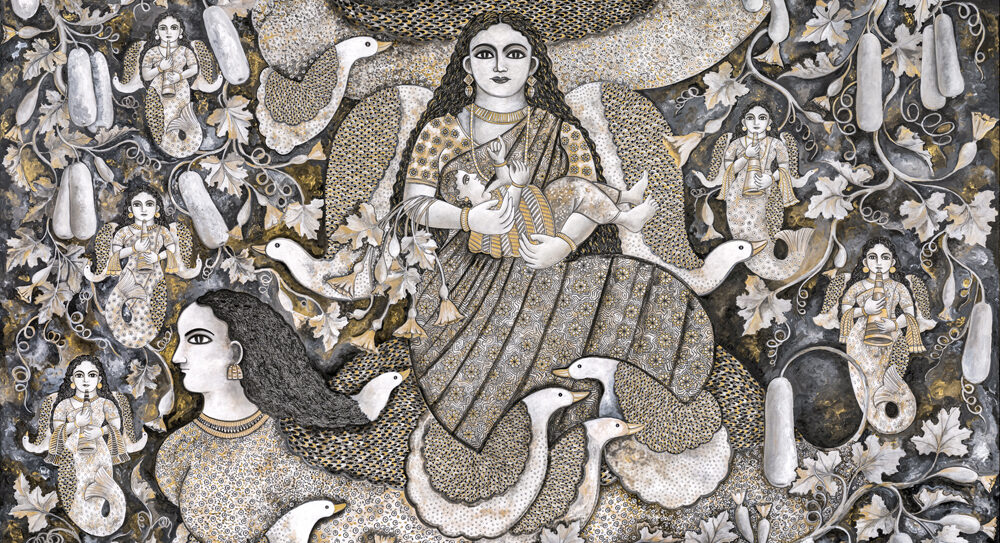Art Musings presents Dhārā, an exhibition that brings together recent works of renowned artist Jayasri Burman. One sees the influence of the rich cultural heritage of Bengal that is predominant in Jayasri Burman’s work. Fables and folk tales from her childhood creep into the narrative, which is full of myth and magic, rituals and festivals. Jayasri Burman has evolved, over a period of time, an iconography that is saturated in the aura of Nature’s nurturing, sustaining, maternal capacities. She invests these capacities in the archetypal figure of the Great Mother, manifested as the Devi, the guardian of waters both still and flowing, attended by animals symbolically associated with fertility and plenitude. Her paintings have an altar-like quality, and depict Nature as divinity. This exhibition features a set of ideas that has absorbed Jayasri over the last several years: Birth, Nature, The Sacred Feminine. As the artist delves deeper into these concepts, there emerges a body of work, delicately nuanced and loaded with fine imagery.
Jayasri says about this body of works, “Birth is the beginning of life. The origin of a journey, from a mysterious somewhere. The Feminine creates the power to transform the present into the future. She knows she is the beginning and the end. Her mystery is ever-changing and beyond comprehension. There is nothing beyond her. She is the nurturer of the cradle of birth, this Earth. The Feminine is what carries away the suffering of the world, and weaves into it an enigmatic cleansing to return it to the world as life – the force of continuity. The earth carries in her soul the power of regeneration, ensuring the return of spring every year, the return of sleep, of rest, of peace. The world breathes out of her cornucopia of strength. That is what is essentially feminine.”
As part of this exhibition, Art Musings has published a monograph authored by poet and cultural theorist Ranjit Hoskote, featuring an essay along with some of the author’s poems, specially written in response to this body of works by Burman.
“In the art of Jayasri Burman, nature is treated as a generative Feminine, a principle of creativity, a source of strength that can absorb all shock and trauma while yet expressing itself through a plenitude of organic expressions: an abundance of water, an efflorescence of plant forms, a diversity of animal life. In personifying these powers of primal regeneration, Jayasri reaches for the archetypes of the Devi in her various aspects, as Bhoomi or earth, Prakriti or nature, Srishti or the environment, Bija or seed. We have gathered all these aspects together, in this exhibition of new works, under the sign of Dhārā, which means flow, currency, fluency; a word that enjoys a pleasing and playful linguistic relationship with Dhara, the stable one who sustains all, another name for the Earth in the abundant Sanskrit repertoire.
Jayasri’s Dhārā summons us to an awareness of the vulnerability of a planet that has always given more than it has taken; a planet whose powers of self-regeneration we have taken cruelly for granted. In her evocations of nature as the Feminine, we may discern such mythic exemplars as the yakshi, the shala-bhanjika and the matrika, nature spirits who protect water sources, groves and the magic of language; we sense, in these compelling figures, the presence of the Devi. Through Jayasri’s forms of re-enchantment, we begin to make our way back to a more equitable and sustainable form of living with nature, living in nature, living as nature.”
(Excerpt from the monograph by Ranjit Hoskote)


